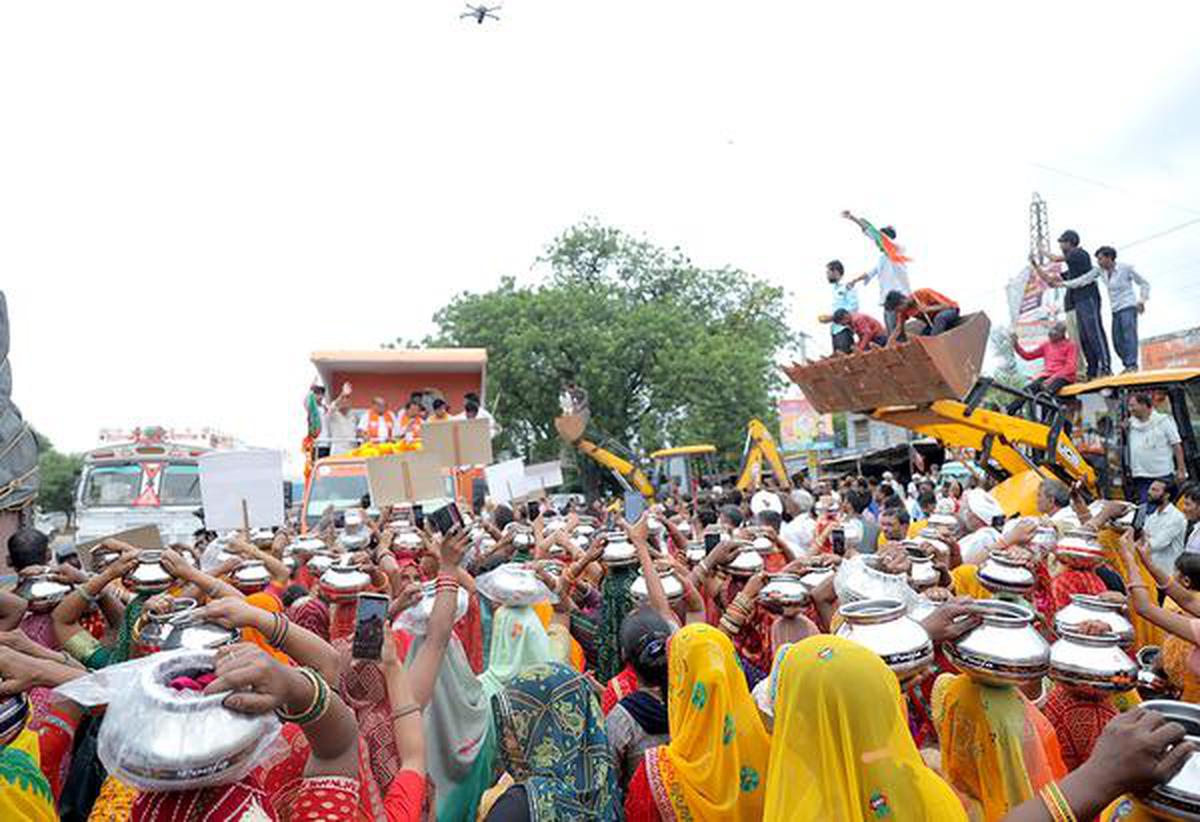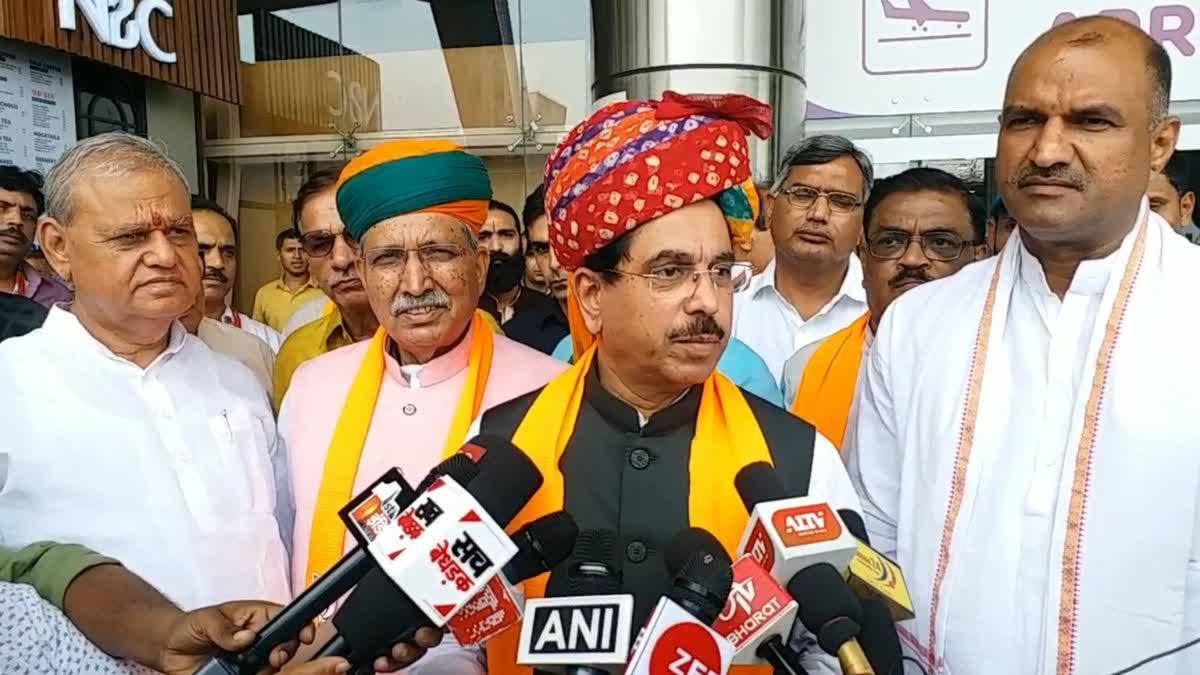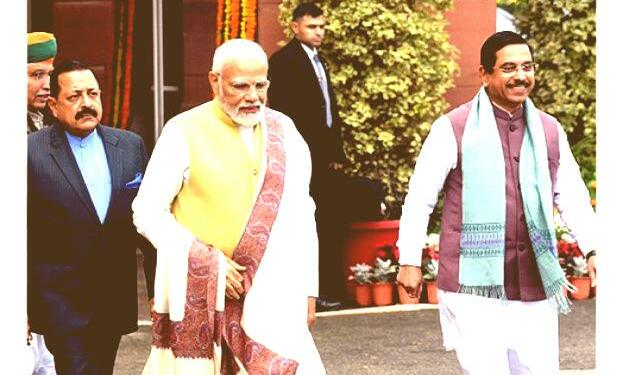In the sun-scorched lands of Rajasthan, where sand dunes rise like waves and palaces gleam like mirages, a political duel was unfolding. This was a land steeped in history, where every grain of sand whispered tales of valor and every gust of wind carried secrets of ancient temples.
The Bharatiya Janata Party (BJP) and the Indian National Congress, two political titans, faced off in this desert arena. The Congress held the reins of power, commanding the press and shaping the narrative with the skill of seasoned raconteurs. Their banners fluttered in the hot breeze, a symbol of their deep-rooted presence in the region.

Meanwhile, the BJP, determined and resolute, prepared to challenge the status quo. Accusations and political strategies were traded like arrows in an old Rajputana duel, each side vying for the upper hand in this battle of wits and wills.
Amidst this whirlwind of political fervor, a quiet, unassuming man from the southern state of Karnataka stepped onto the scene. His arrival in Rajasthan was as understated as his demeanor, yet his presence was a turning point in the BJP’s campaign. Tasked with steering the party’s ship in these turbulent waters, he brought a new perspective, one that was foreign to the fiery politics of Rajasthan. His name, Pralhad Joshi.
Born in the humble town of Dharwad, Karnataka, in 1962, Pralhad Joshi’s political journey was nothing short of meteoric. From his initial days as an industrialist to a bold figure leading the charge to hoist the Indian Tricolor at Idagah Maidan in Hubli, Joshi’s early forays set the stage for a remarkable career within the BJP. His strategic acumen and dedication to development quickly established him as a significant force in Karnataka’s political landscape.
Joshi’s political trajectory was marked by significant milestones. He played a pivotal role in the “Save Kashmir Movement,” a testament to his ability to capture the public’s imagination and address key national issues. His rapid rise saw him becoming the President of the BJP in Dharwad district, eventually leading to his election as a Member of Parliament for the Dharwad constituency for four consecutive terms, starting in 2004. His commitment to his constituents and focus on regional and social issues garnered him widespread respect and recognition.
Endorsed by Prime Minister Modi, Joshi’s political capabilities were further recognized when he was appointed as the Union Minister of Parliamentary Affairs, Coal, and Mines. In these roles, he demonstrated exceptional leadership and strategic planning.
He managed the parliamentary sessions effectively for over 100 days annually, played a crucial role in facilitating legislative passage, and spearheaded transformative policies in the coal and mining sectors.
These achievements, coupled with his strategic contributions to the BJP in various elections, including key victory in Uttarakhand, cemented his reputation as a master strategist and a trusted figure within the party and the government.
His influence and work have been consistently praised by senior leaders, including Prime Minister Narendra Modi, Home Minister Amit Shah, Defence Minister Rajnath Singh, and Finance Minister Nirmala Sitharaman, underscoring the trust and confidence placed in him at the highest levels of government.

PM Modi’s and BJP Chief JP Nadda’s trust on Joshi was proved when he was given the charge of Rajasthan election on 7th of July 2023. It was a real curveball for Joshi. The pressure was immense. This wasn’t just about winning seats; it was about changing the political narrative. For Joshi, it was a challenge that demanded not only his political skills but also his ability to connect with people and understand the complex dynamics of a state as diverse as Rajasthan.
The majestic palaces and ancient temples stood as silent witnesses to the unfolding drama, their grandeur a stark contrast to the simplicity of the man from Karnataka.
The BJP, looking to make a comeback in the state, faced a rocky road ahead. With 200 Vidhan Sabha seats up for grabs and the polling date set for November 25, the stakes were sky-high.
The BJP’s position was precarious. Internal debates and disagreements over party tickets were the talk of the town. But Pralhad Joshi, along with BJP President JP Nadda, stepped into the fray with a masterstroke. They crafted a candidate list that was a blend of experience and fresh energy, a calculated mix of party loyalists from various factions, and some self-made political figures. Their bold move of fielding seven sitting MPs was a clear signal – the BJP was all in to reclaim Rajasthan.
Rajasthan had an unprecedented 22 lakh first-time voters, a demographic that could swing the election in any direction. The youth vote was a battleground, and the BJP was ready to fight.

Under Joshi’s guidance, the state BJP turned the paper leak issue into a powerful campaign tool. They highlighted the plight of the unemployed youth, promising transparency and reform in the recruitment processes. This move resonated deeply with the young voters, who were eager for change and accountability.
As the campaign intensified, Joshi’s role became more crucial. He was not just a strategist but also a voice for the disgruntled youth. His ability to connect with the electorate and address their concerns head-on was turning the tide in BJP’s favor.
The political chessboard in Rajasthan was set, and as the Congress grappled with the internal Gehlot-Pilot tussle, the BJP, under Pralhad Joshi’s shrewd leadership, was making its move. While the Congress leaders were embroiled in their own battles, Joshi shifted gears to what he knew could be a game-changer – meticulous booth management.
Joshi knew that the real battle would be won on the ground, in the heart of each constituency. With the polling day fast approaching, he orchestrated a flurry of last-minute strategies, all aimed at one goal: maximizing voter turnout on Friday.

Under his direction, the BJP’s campaign transformed into a high-octane drive. Extensive Door-to-door campaigns were organized. Party volunteers, armed with lists of voters and persuasive talking points, fanned out across the state, knocking on doors, and weaving through narrow lanes. Their mission was clear – ensure every BJP supporter makes it to the polling booth.
WhatsApp became a powerful tool. Tailored, compelling content designed to motivate and mobilize were shared with citizens and supporters.
Joshi also pushed each BJP candidate into a whirlwind tour of their constituencies. These were not mere meet-and-greets; they were strategic campaigns aimed at drumming up support and creating a wave of enthusiasm. The candidates, following Joshi’s lead, crisscrossed their regions, addressing rallies, engaging with local communities, and reinforcing the party’s message.
The political landscape in Rajasthan, already buzzing with the frenetic energy of the BJP’s campaign, was set to witness a seismic shift. Enter Prime Minister Narendra Modi – the twice-crowned king of Indian politics. His arrival in the fray wasn’t just a visit; it was a spectacle that transformed the already motivated electorate into a fervent, almost devotional crowd.

PM Modi’s charisma and his reputation had a magnetic effect. His rallies were grand gatherings that resonated with the hopes and aspirations of the people. Every speech he delivered, every promise he made, echoed through the towns and villages of Rajasthan, igniting a sense of belief and passion among the masses.
As the election day drew near, the desert state became a mosaic of political rallies and fervent speeches. The Congress, left no stone unturned in their quest for victory. Amidst the cacophony of accusations and counter-accusations, the man from Karnataka remained a beacon of calm, his quiet confidence an anomaly in the boisterous world of Rajasthan politics.
On 3rd December 2023, in a dramatic turn of events, the BJP clinched a decisive victory in the Rajasthan Assembly election, seizing power from the Congress. The triumph was clear-cut, BJP emerged as the single largest party, crossing the halfway mark with an impressive tally of 115 out of 199 contested seats. The Congress trailed significantly, managing only 69 seats.
This victory was not just a political shift; it was a testament to the effectiveness of the BJP’s top brass. Prime Minister Narendra Modi’s promise of “delivering on guarantees” resonated deeply with the voters, his assurance serving as a beacon of hope and action. Home Minister Amit Shah’s strategic prowess played a crucial role, with his tactics proving successful in navigating the complex political landscape of Rajasthan. BJP Chief JP Nadda’s well-laid plans were instrumental, his leadership guiding the party towards this significant win.
At the heart of this triumph stood Pralhad Joshi, whose vision and wisdom were pivotal. His astute management and strategic insights were the linchpin in this hard-fought battle. His ability to unite the party under a common goal and effectively harness the strengths of his team was a masterstroke that played a crucial role in securing this momentous victory for the BJP.



























